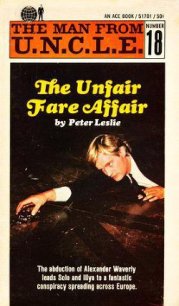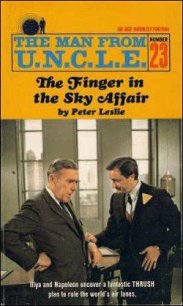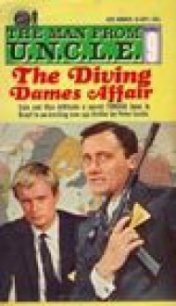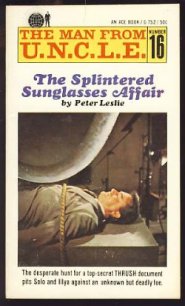The Radioactive Camel Affair - Leslie Peter (читать полные книги онлайн бесплатно .TXT) 📗
“You are very kind.”
“It is a pleasure…Oh, there is one thing: such extracurricular activities regrettably involve the participant in certain expenses. There are various charges, payable to the departments involved, inseparable from the issue of such papers, I am afraid.”
“Not at all. It is to be expected. I have already trespassed too much on your generosity—but, since it is out of office hours and I have no other way of paying them, would it be too much of an imposition if I were to entrust these monies to you for disbursement in the right quarters?”
“In the circumstances,” Hamid said suavely, “I would be prepared to waive protocol and perform that service for you.”
Illya reached for his wallet.
Later, when he had rejoined Solo in the hotel, he unloaded the spool from the tiny camera concealed in his cigarette lighter and developed the film. Two of the shots he had taken were too blurred to be of use. The other three were as clear as a bell: two profiles of Hamid pointing at the map of Sudan, and one full face of him standing by the flag and tapping his teeth with the gold pencil.
“We’ll print them up,” Solo said. “Just in case…”
After that, Kuryakin dismantled the miniature lapel microphone and the fine wire lead connecting it with the cigarette-case tape-recorder in his breast pocket, and they played back the recording of his interview. The tape had run out in the middle of Hamid’s sentence about “extracurricular activities” involving the participant in “certain expenses.”
“That is interesting,” Illya said. “We’ve lost the part where he agrees to take the money himself. Also the amount, which came later. There’s nothing there we could use as a lever if ever we needed to—it’s just a man going out of his way to accommodate a foreigner, on the face of it.’“
“Never mind,” Solo said, clapping him on the shoulder. “What we have is very interesting, as it is. Your Russian act was inspired!”
“Yes, I suppose it could have been worse.”
At eight-thirty, Solo took Hamid’s scrawled note of introduction, his own passport, and a further supply of money to the address Illya had been given. He was back in less than an hour with an imposing document calling upon all whom it might concern to let Napoleon Solo, photo attached, freely pass without let or hindrance at the peril of enraging His Excellency Hassan Hamid, and so on, and so on.
“Funny thing, security,” he said to Illya. “They take every precaution under the sun to ensure that the guy who gets the document is the one whose passport they have, and that the mug on the document is the same as the one on the passport—even to the extent of taking the pictures themselves. But there’s no check whatever on whether the guy with the passport calling for the thing is the same as the one who originally asked for it!”
“Thank goodness,” Illya said soberly.
The next morning Marshel came to tell them that one of his spies had found out that the caravan was headed for Wadi Elmira, where the contingent of pilgrims was to leave the main body and head south.
“There’s only one other trail out of Elmira,” he said. “Southwest to Halakaz and Gabotomi. So the other lot must be heading there. You’ll have to find out which party the stuff’s with before you get there, so you’ll know whether to stick with the religiosos or trail the rest at a distance.”
“How long will I have?”
“God knows. Several days—they don’t exactly break speed records. But, if you ask me, it’ll be with the other lot—the traders and such. Pilgrims travel light and it will be easier to conceal a heavy lead canister among bundles of merchandise on pack camels than it would be among bedrolls and riders.”
“True. But I have to be sure. After all, they do have a specific place to take it, don’t they?”
“Isn’t Gabotomi one of the so-called Forbidden Cities?” Illya asked suddenly.
“Was, old boy. Was. It’s in the middle of the rebel country now. You chaps are heading for a hotbed of trouble, you know.’
“Yes, what’s the strength of this rebel bit?” Solo asked.
“Strong enough, actually. Of course, they play it down up here—but in actual fact there’s a spot of the old genocide going on in the south. Real race war stuff. Up here and in the Nile Valley and the desert, it’s all Arabs; the Muslims rule the country, after all. But the uncivilized part, in the south—that’s all missionary Christians, fetishists and so on. And of course they loathe each other’s guts. As soon as the Raj pulled out, the Arabs began a systematic campaign of wiping out the others. They send troops down and wipe out whole villages—kill the lot and burn the place to the ground. So naturally the natives consider themselves a persecuted minority and to be an Arab in that area is to be a dead man. If you have to leave that caravan, Mr. Solo, I should junk those borrowed robes pretty damn quick! You can’t trust those types, you know.”
“It’s obvious where your own sympathies lie,” Solo said.
“With the Arabs, you mean? Well, of course—I mean, well, you can talk to them, can’t you?”
After dark, when the fierce and breathless heat of the day had abated, they paid their bill and checked out of the hotel. Illya was to fly to Stanleyville in the Congo, from where—if Waverly had acted on Marshel’s radioed request—a helicopter would take him north to the Sudan border. Here, he was to move north further still, assume the role of a big game photographer and move into the Sudan in a Landrover.
“We’ll keep in touch by radio,” Solo said. “If you prospect in the general direction of Gabotomi and Hala-kaz, and keep your eyes and ears open, you might come across something. Good God, if they’re building an atomic plant or hydrogen bombs, something must be there to see; somebody must have noticed. Those places take up acres and acres!…In the meantime, I’ll stick with the caravan and try to trail the canister. With luck, we ought to end up at the same place…”
He himself, as soon as Kuryakin had left for the airport with most of their equipment, hurried to a rendezvous with a man called Nassim. Under Rodney Marshel’s guidance, he suffered himself to be stained brown all over and bearded, hair by hair, along the edge of his jawline. His teeth were discolored, his hands roughened and his nails artificially cracked and grimed. With wax cunningly inserted inside his nostrils to alter the shape of his nose, he would have passed unrecognized even by Waverly.
“According to your papers, effendi,” Nassim said, stepping back to admire his handiwork, “you have come all the way from Al Khuraiba in Saudi Arabia to go on this pilgrimage. Let us hope this will be considered sufficient excuse for any inconsistencies of accent when you speak Arabic.”
Beneath the heavy burnoose, Solo slung the borrowed Mauser in a makeshift holster provided by Marshel. Around his waist next to the skin was a Chubb-locked money belt—containing, apart from local currencies, his miniature transceiver and one or two other devices.
Then, with Nassim as his guide, he mounted a horse and rode out of the city towards the dawn rendezvous which was to initiate his uncomfortable journey into the unknown.
Chapter 7
Caveat for the General
THE FRONTIER WAS a collection of wooden huts straddling the dust road; the border was a barbed wire fence interrupted by a striped pole with a counterweight on one end. Inside the hut nearest to the highway, a platoon of soldiers lounged, exchanging pleasantries with the frontier guards. Both soldiers and guards wore British-style khaki uniforms—and all of the men there were Africans.




![[The Girl From UNCLE 04] - The Cornish Pixie Affair - Leslie Peter (читать книги полностью без сокращений бесплатно .TXT) 📗](/uploads/posts/books/56865/56865.jpg)